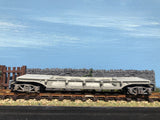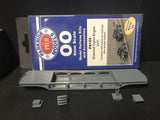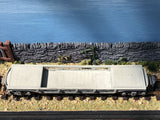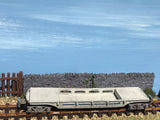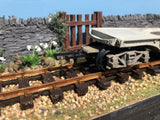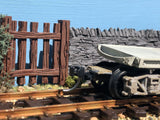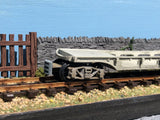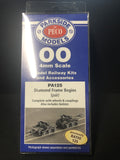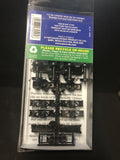Welcome to our eBay listing for the GN15 Pechot style Wagon Kit.
Key Features:
GN15 Bogie Pechot Wagon: This high-quality kit provides you with all the components necessary to build your own GN15 Pechot Well Wagon model, based on the the historic military railway vehicle used during World War I. The wagon is designed specifically for narrow gauge model railways, adding a touch of authenticity and uniqueness to your layout. The wagon features a sturdy construction, allowing it to handle the demands of your miniature railroad.
Pair of Bogies: The kit includes a pair of finely detailed bogies, providing excellent stability and smooth operation for your GN15 wagon. These bogies are designed to fit perfectly with the wagon, ensuring a seamless integration and allowing for realistic movement on your layout.
NEM Pocket System: We understand the importance of versatility and compatibility in the world of model railways. That's why this kit includes the NEM pocket system, which allows you to easily attach and detach compatible accessories, such as couplings or additional wagons, enhancing the functionality and expandability of your layout. Use these as alternative to the default bogie couplings. It comes with a pair of standard Pin and chain buffer blocks, but you can switch these out for Hornby style couplers, Hunt magnetic or Kadee couplers (not supplied)
Easy Assembly: The kit is designed with modelers of all skill levels in mind, the bogies are a push fit and can be glued into position if required.
Product Details:
⢠Scale: 1:22.5
⢠Model Type: Pechot Well Wagon
⢠Dimensions: Approx. 157mm x 33.5mm
Compatibility: NEM 362 pocket system compatible
two buffer blocks
Note: Please ensure compatibility with your existing layout and equipment before purchasing. Feel free to contact us if you have any questions or need further assistance. Happy modeling!
The Pechot well wagon, also known as the Pechot-Bourdon system, was a specialized military railway vehicle used during World War I. It was designed to transport heavy artillery and supplies on narrow-gauge railway tracks.
The concept for the Pechot well wagon was developed by Colonel Pechot and engineer Louis-Adolphe Bourdon in the late 19th century. The wagon consisted of a low, flatbed platform with four wheels, each equipped with a well or depression in the center. This design allowed the wagon to straddle the narrow-gauge tracks while accommodating the large diameter wheels of artillery pieces.
The Pechot well wagon was a significant innovation as it provided a means of rapidly deploying heavy artillery and supplies on existing narrow-gauge railway networks. It was particularly useful in areas where standard gauge railways were not available or practical. The wagonâs design allowed for easy loading and unloading of equipment, making it efficient for military logistics.
During World War I, the Pechot well wagon was utilized by various countries involved in the conflict. It played a vital role in transporting heavy artillery to the front lines, facilitating the movement of troops and supplies. By using these well wagons, military forces could quickly bring their firepower to bear in different locations, contributing to the evolution of mobile warfare tactics.
However, with the development of more advanced transportation methods like motorized vehicles and improvements in standard gauge railways, the use of the Pechot well wagon declined after World War I. Today, the wagonâs design remains an interesting chapter in military engineering history, showcasing the ingenuity and adaptability of wartime logistics.









